

The theory of successful intelligence. Emotional Intelligence Coaching - Emotional Intelligence Coach. Developing higher levels of "Emotional Intelligence" (mastery in the collection of social, interpersonal, self-awareness. leadership and self-management skills) has been proven to be the single most powerful thing you can do to advance your career, professional and personal relationships, and overall happiness.
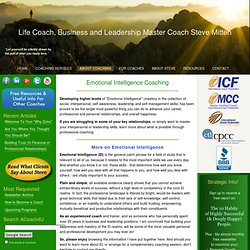
If you are struggling in some of your key relationships, or simply want to master your interpersonal or leadership skills, learn more about what is possible through professional coaching. More on Emotional Intelligence Emotional Intelligence (EI) is the general catch phrase for a field of study that is relevant to all of us, because it relates to the most important skills we use every day. And whether you know it or not, these skills - that determine how well you know yourself, how well you deal with all that happens to you, and how well you deal with others - are vitally important to your success. So, please enjoy browsing the information I have put together here. Herman Ebbinghaus: the forgetting curve.
Our memory and power of recall detriorates rapidly if we do not reinforce what we have learnt.
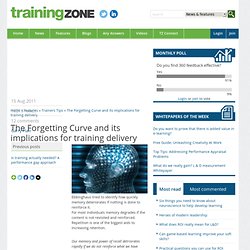
Garry Platt looks at the implications for training design and delivery. In 1895 Herman Ebbinghaus published some fascinating research which many people in the training community diligently ignore or are simply unfamiliar with. This is strange as it has significant and direct implications on how we design and then deliver learning, training or development. It also underpins the ultimate effectiveness and results that we obtain as professional developers and trainers.
In his book Memory: A Contribution to Experimental Psychology, Herman Ebbinghaus presented the findings of a study he conducted into memory and recall, from this work has stemmed the term The Forgetting Curve. This work despite being more than 100 years old is still pertinent today and is complimented by current research (J. Ebbinghaus discovered that even with this simple task memory failed at an alarming rate. Aching: transformative approach. Susan Askew and Eileen Carnell explore how coaching can support learning within the organisation.
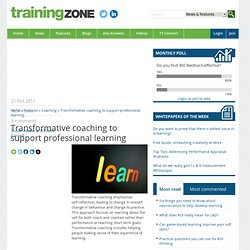
This article presents ideas about the importance of coaching in supporting professional learning. The premise underlying this approach is that the role of the coach is to support people’s learning at work. The central issue addressed is how we learn, and how we can facilitate the learning of others. The emphasis is on helping the coachee, the coach, the coach-learning group and the organisation learn in a particular way. The aims for transformative coaching are closely aligned with Rogers’ (Coaching skills: a handbook, 2004) definition, in that learning and change, both for the coach and coachee, are at the core. Sue Askew: "Within this cycle of learning, the coach would share hunches, make empathetic statements and may challenge the coachee. " The coaching process is based on a learning cycle.
Reflective learning Values and beliefs Cultural issues are also important in coaching. COACHING MODELS « Executive Coach In India. This article appreared in People Matters - November 1, 2011 issue.
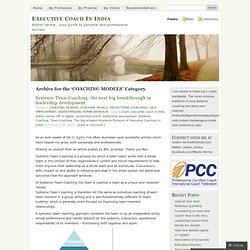
It carries my views on the field of coaching in India at present and the future trends which may be seen in the industry. Would be happy to recieve your comments. How matured is the concept of ‘executive coaching’ in India? I would say it is still in a very nascent stage. Though there has been substantial growth in the last 2 years and while there are no ready figures, my guess is that we have seen a growth of 30-40 percent. What is the role of a coach? Coaching is a dynamic, creative and systematic process, where the coach enables the coached to get useful insights by the power of asking high-gain questions.
What is the ‘coaching style’ that you have adopted and why does it work best for you? Why corporate mentoring often doesn’t work. The traditions of mentoring in organisations may be worthwhile but, warns Judith Germain, may doing more harm than good.
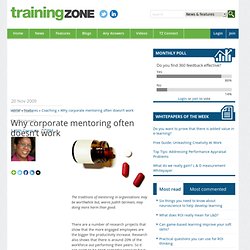
There are a number of research projects that show that the more engaged employees are the bigger the productivity increase. Research also shows that there is around 20% of the workforce out performing their peers. So it can seem to be good economic sense to have the 20% as engaged as possible. Often this is the focus of succession plans and internal mentoring schemes. Many readers will have heard of the need to concentrate on ‘high potentials’ or ‘key talent’. Whilst the intent is laudable often the implementation is not, with only a few exceptionable companies getting the results that they expected or receiving a good return on their investment.
Everyone needs a mentor: fostering talent in your organisation - David Clutterbuck. Aching for Performance: Growing Human Potential and Purpose - John Whitmore.